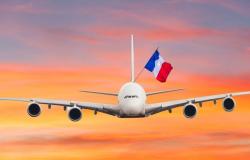Turkish President Recep Tayyip Erdogan was received with great fanfare in Iraq on Monday to sign around twenty agreements and increase economic cooperation, his first visit in more than a decade marked by thorny discussions on regional security and water sharing .
President Erdogan’s last trip to Iraq dates back to 2011. As Prime Minister, he urged Baghdad to cooperate in the fight against Turkish Kurdish fighters from the PKK, the Kurdistan Workers’ Party, classified as a “terrorist” group by Ankara and its Western allies.
On Monday, on angry subjects, Mr. Erdogan and Iraqi Prime Minister Mohamed Chia al-Soudani stuck to the traditional positions of their country, while highlighting the economic opportunities to come.
In addition to the signing of 24 memoranda of understanding, Mr. Soudani welcomed a “strategic framework agreement” aimed at “building sustainable cooperation in all areas” via permanent commissions “for security, energy and the economy.
The talks also focused on the PKK.
“We discussed joint measures that can be taken against the PKK and its extensions, which target Turkey from Iraqi territory,” insisted Mr. Erdogan during a joint speech.
“On this occasion, I shared with my counterparts my firm conviction that the presence of the PKK on Iraqi territory will end as quickly as possible, by being officially declared a terrorist organization,” he argued.
“Bilateral security coordination”
| © POOL/AFP Iraqi Prime Minister Mohamd chia al-Soudani and Turkish President Recep Tayyip Erdogan make a joint statement to the media in Baghdad, April 22, 2024 |
For 25 years, Turkey has installed military bases in Iraqi Kurdistan to fight against the rear bases of the PKK. It regularly carries out operations against these fighters in Iraqi territory.
Mr. Soudani soberly spoke of “bilateral security coordination” which will respond “to the needs of both parties, and will make it possible to face the challenges posed by the presence of armed elements, likely to cooperate with terrorism and violate the security of two countries”.
In March, Iraqi Defense Minister Thabet al-Abassi ruled out “joint military operations” against the PKK, while emphasizing that Baghdad and Ankara would work “at the appropriate place and time” to establish “a Joint Intelligence Coordination Center.
Another subject of contention, the sharing of the waters of the Tigris and the Euphrates. The Iraqi authorities castigate the Turkish neighbor for the dams built upstream and which have reduced the flow of the two mythical rivers arriving in Iraqi territory.
On Monday the two countries signed a ten-year “framework agreement on the water issue”.
Objective: joint projects aimed at “improving water management” of the two rivers, assured Mr. Soudani, who thus hopes for a “common and equitable administration of water resources”.
“It is not in anyone’s interest for the situation to worsen regarding water and Iraq’s quota,” he said.
“It is a fact that the climate crisis negatively affects Turkey (…) as well as Iraq,” recalled Mr. Erdogan. “Using water efficiently by avoiding waste is as important as the quantity of water,” he stressed.
“Stimulate growth”
On the agenda was the “Development Road”, an ambitious road and railway project, a 1,200 km corridor to connect the Gulf to Turkey via Iraq by 2030.
| © AFP Another sensitive issue: oil exports, formerly carried out by Iraqi Kurdistan without the approval of Baghdad, which transited through the Turkish port of Ceyhan |
On Monday, in the presence of Erdogan and Soudani, four ministers representing Iraq, Turkey, the United Arab Emirates and Qatar signed a “quadripartite memorandum of understanding” on their cooperation on the “Development Road “, according to an Iraqi statement.
The signatory countries will have to “establish the necessary frameworks for the implementation of the project”, specifies the text, which recalls that the initiative “will contribute to stimulating economic growth”.
Finally, the Turkish president arrived in the evening in Erbil, capital of Kurdistan in northern Iraq, where he was welcomed by the President of the autonomous region, Nechirvan Barzani, and Prime Minister Masrour Barzani. He also spoke with the patriarch of the clan, Masoud Barzani.
Among the sensitive issues on which Iraq and Turkey cannot agree are oil exports, formerly carried out by Kurdistan without the approval of Baghdad, and which transited through the Turkish port of Ceyhan.
They have been stopped for more than a year, due to disputes and technical problems.
burx-tgg/hj







